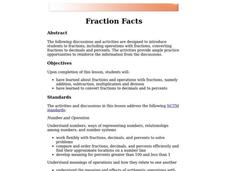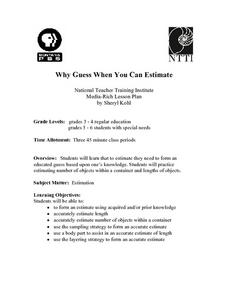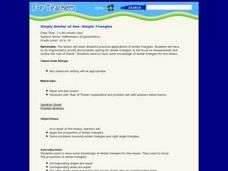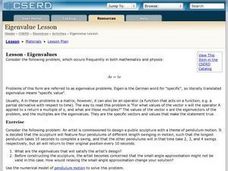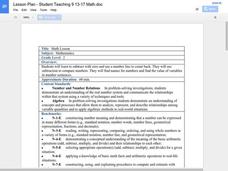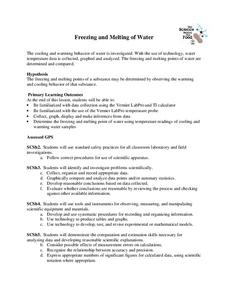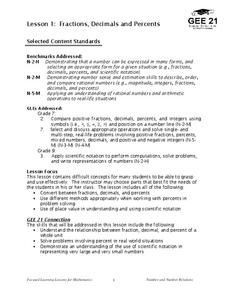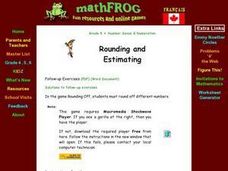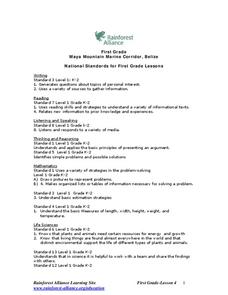Curated OER
CATCH, TAG and RELEASE
Students apply estimation strategies for problem-solving purposes. They become familiar with one aspect of a marine biologist's work.
Curated OER
Grade 5 Basic Math
In this grade 5 math learning exercise, 5th graders answer a set of 22 multiple choice problem solving and estimation questions. Worksheet may be completed on-line and answers submitted.
Curated OER
Dividing By 3 and 4
Third graders are introduced to how to divide by 3 and 4. They are told that are going to use the same procedures as they did on yesterday, except with new divisors. Students turn their attention to the Paddle Problem on page 206 of...
Curated OER
Fraction Facts
Students are introduced to fractions, including operations with fractionsm converting fractions to decimals and percents. They are provided with activities that provide ample practice opportunities to reinforce the information from the...
Curated OER
The Babylonian Algorithm, Limits and Rates of Change
In this successive approximations worksheet, students use the Babylonian algorithm to determine the roots of given numbers. They identify the limits of a function, and compute the rate of change in a linear function. This two-page...
Curated OER
Numerical Analysis: Polynomial Interpolation
In this polynomial worksheet, students identify the interpolated and extrapolated value of given equations. This four-page worksheet contains approximately ten problems. Explanations and examples are provided.
Virginia Department of Education
Modeling Multiplication of Fractions
Multiply your understanding of multiplying fractions. A short lesson teaches pupils how to multiply fractions. By using fraction models, they get a better understanding of the concept.
Curated OER
Why Guess When You Can Estimate
They apply various strategies in their estimations. They analyze the differences between guessing and estimating. They estimate the number of beans and jellybeans in egg cartons and jars respectively.
Curated OER
Simply Similar at Sea: Simple Triangles
Tenth graders answer a variety of problems based on similar triangle and learn about the rule of thumb. They will test the rule of thumb by estimating the distance to an object in the classroom.
Curated OER
Physics: Eigenvalues
Students solve problems by discovering the eigenvalues that satisfy design questions. They explain how relaxing a small angle approximation can change the solution. Students apply the numerical model of pendulumm motion to solve the...
Curated OER
How Many Months?
Learners investigate the first Peter the Mint Eagle, who lived at the Philadelphia Mint from 1830 to 1836. They determine how many months Peter was there and use pictures, numbers, equations, and/or words to explain how they came up with...
Curated OER
Number Line Math
Second graders use a number line to practice subtraction. In this subtraction lesson, 2nd graders use a number line to count backwards. Students participate in mad math activities and solve problems.
Curated OER
Where Are We Going?
Students practice rounding numbers to ones and tens places, multiplying numbers, and working with simple fractions. They study the placement and distances of planets in the Solar System.
Curated OER
Metric Measurement
Students use, read and write with metric units. They practice converting from larger to smaller units. Afterwards, they construct a scale drawing of a bridge. In addition, they construct these two designs, using the same scale of 1cm to...
Alabama Learning Exchange
Comparing Fuel Economy
Compute fuel economy and gas mileage. Why? So you can teach rates and ratios, of course! Middle schoolers calculate the rate of miles per gallon for various vehicles. They research each vehicle, its mileage per gallon, and cost per...
Curated OER
Geometry, Pi, and Ancient Civilizations
By working together, pairs of students will complete a Pi webquest. Using the internet, they examine the ways people in the Ancient Civilizations of Egypt, Babylonia and Greece used Pi. To end the lesson, they review the concepts of...
Inside Mathematics
Quadratic (2009)
Functions require an input in order to get an output, which explains why the answer always has at least two parts. After only three multi-part questions, the teacher can analyze pupils' strengths and weaknesses when it comes to...
University of Georgia
Freezing and Melting of Water
Examine the behavior of energy as water freezes and melts. An engaging activity provides a hands-on experience to learners. Collaborative groups collect data and analyze the graphs of the temperature of water as it freezes and then...
University of Georgia
Heating and Cooling of Land Forms
Compare heating and cooling rates of different land forms. A lab activity has groups collect data on the rate of heating and cooling of soil, grass, saltwater, fresh water, and sand. An analysis of the rates shows how the different land...
Pennsylvania Department of Education
Adding Common Fractions
Fourth graders estimate various measurements. In this lesson on measurement, 4th graders estimate the length and mass of multiple objects. Students discuss the difference between a guess and a reasonable estimate and discuss using...
Louisiana Department of Education
Fractions, Decimals, and Percents
Fractions, decimals, and percents all say the same thing! Show your classes how to convert between the three forms using visual and numeric representations. Then lead them to an understanding of scientific notation.
Curated OER
Discovering Math: Computation
Middle schoolers add, subtract, multiply, and divide rational numbers. They find the square and the cube of numbers. They create a game incorporating computation on rational numbers. Everyone works together to write and evaluate...
University of Waterloo
Rounding and Estimating 1: Introduction
Pupils practice mental math skills in math drills. They play the online interactive game "Rounding Off" to practice rounding off different numbers. Afterward, they complete a paper based follow up exercise for reinforcement.
Curated OER
Who Takes Care of the Maya Forest Corridor?
First graders study the animals in the Maya Forest Reserve. In this conservation instructional activity, 1st graders create a graph to compare the environment of animals to their own. They design a 3D model of these two environments.





